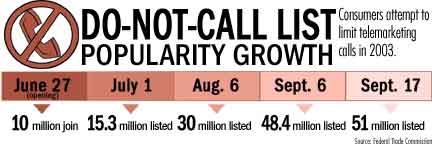Some fed-up students consider the do-not-call registry a blessing that will shield them from numerous unwanted telemarketing calls.
Kristen Carter, a psychology senior, said she would put her name on the registry because she has received calls from telemarketers while she was in class.
“I wish they would stop calling,” Carter said.
Tristen Johnson, a mechanical engineering freshman, also said he feels the registry is a blessing because he does not like receiving calls from telemarketing companies.
“They don’t take ‘no’ for an answer,” Johnson said. “They harass me.”
He said he is happy that something is being done finally to stop the unwanted calls.
According to the National Do-Not-Call Registry Web site, the registry was created to give consumers the opportunity to decide if they want to receive calls from telemarketers.
Under the registry, telemarketers are prohibited from calling anyone who is on the list.
When it started on June 27, 10 million people applied to the registry within 24 hours.
According to the Associated Press, 50 million people have added their numbers to the do-not-call registry.
The registry is slated to take effect Wednesday, but ongoing legal battles with telemarketing companies could delay the start of the registry.
Catherine Harrington-McBride, Federal Trade Commission spokeswoman, said the do-not-call registry was suggested in 1996 by Congress.
She said the do-not-call is an amendment under the Telemarketing Sale Rules, a large series of rules adopted in 1995 prohibiting deceptive practices by telemarketing companies.
She also said during the development of the registry, the FTC accepted 64,000 public comments from citizens who expressed dislike for unwanted commercial calls.
Harrington-McBride said Congress gave the FTC $18.1 million to pay for the infrastructure development, maintenance and enforcement of the registry.
In a January 2003 press release, Federal Trade Commission’s Timothy Muris said the national registry will give consumers an efficient way of signing up for do-not-call registries under state and federal laws.
He said it also will allow customers to file complaints quickly against companies which violate the act.
According to the Associated Press, the FTC can enforce an $11,000 fine on telemarketing companies that continue to call any number listed on the do-not-call registry.
Telemarketers are required to check the list for updates every three months.
Telemarketing companies can purchase the list of numbers on the registry for $25 per area code, the Associated Press said. Companies can get the list for the entire country for $7,375.
Even though some telemarketing companies have agreed to comply by the rules of the registry, others such as the Direct Marketing Association believe the registry could have negative effects upon the telemarketing industry.
The registry will block an estimated 80 percent of telemarketing calls.
Harrington-McBride said she does not feel the registry will have negative effects on the industry.
“Calling people who don’t want to be called is counterproductive,” she said. “Calling people who do want to be called is productive.”
Despite the echoed sentiment from some University students, other students do not agree with the list and feel that it will hurt the telemarketing industry.
Heather Walker, marketing freshman, said she feels backlash against telemarketers is pointless.
Walker said she doesn’t mind receiving calls from telemarketing companies.
“I, personally, think it’s fine for them to call me,” Walker said.
She said the government is wasting its time with the registry when it should be focusing on more important issues such as world hunger or terrorism.
“It [is] a waste of time on something that’s not important,” She said.
Walker also said the registry will lead to an increase in unemployment.
“It will ultimately get rid of several types of jobs,” Walker said. “It will cause more problems because there will be a shortage of jobs.”
Phalguna Kumar Rachinayani, an electrical engineering graduate student, said the possibility of people losing their jobs would make him reconsider adding his name to the list.
“I wouldn’t want people to lose their employment,” Rachinayani said.
For more information or to register on the list, go to www.donotcall.gov or call 1-888-382-1222.
Do-not-call list draws applause, disapproval
September 30, 2003

Do-not-call list draws applause, disapproval



